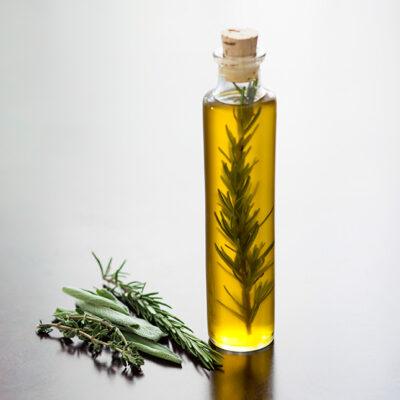
Thyme Oil
Thyme essential oil, made from the herb Thymus vulgaris, has been traditionally used in the Mediterranean region for thousands of years as a common remedy for a number of ailments. It had a widespread reputation across many countries and ancient cultures. The Egyptians used it for embalming; the Greek for courage; the Romans for purification of the air; and many Asian cultures for spicing up their food and for aiding digestion. However, the herb is important in French cuisine, too, with the fresh sprigs being part of bouquet garni.
The oil is derived from the leaves and flowers of the plant and has a strong smell that is hot and spicy in character. The main ingredient that gives the essential oil its characteristic smell and excellent antiseptic ability is thymol. It constitutes more than 50 percent of the volatile oil component of the essential oil. Besides thymol, there are a few more potent aromatic oils that provide a myriad of medical properties to this oil. These are eugenol, linalool, alpha pinene, alpha thujene, beta caryophyllene, camphene and carvacrol.
Below are some ways you can get the most out of this highly potent essential oil.
1. As an antiseptic and antibacterial agent
Thyme essential oil has been used for ages as an antiseptic to prevent infections from developing on damaged skin. However, since it is a strong oil, it should be diluted with coconut oil before applying directly on cuts and bruises. The addition of coconut oil aids in healing and has a strong antibacterial component of its own.
Effectively treat contagious fungal diseases like ringworm and athlete’s foot by topical application. Redness developing in skin creases during hot weather may be a sign of either bacterial or fungal infection. Thyme oil can take care of it as it has both antibacterial and antifungal properties.
2. For gastrointestinal health
Thyme oil is edible and non-toxic at levels used for therapeutic purposes, so can be safely used to treat colitis and other stomach infections. Lab tests have repeatedly proven its superior effect against E. coli and Methicillin resistant Staphylococcus aureus (MRSA). Wiping door handles, toilet seats, kitchen counters and other frequently used surfaces with cotton doused with thyme oil can reduce the bacterial load and thus chances of infections spreading.
3. To treat rheumatism

Thyme Oil
The stimulant effect of thyme essential oil makes it a good treatment for rheumatic and arthritic pain. Apply the oil mixed with olive oil on stiff joints and aching muscles. Deposition of uric acid crystals in the joints is a major cause of pain in people suffering from gout. The oil improves circulation and facilitates the elimination of these unwanted materials from the blood and elsewhere in the body. Water retention in the tissues exacerbates painful muscular conditions. The oil has a proven diuretic effect. It helps kidneys to flush out excess water.
4. As a digestive aid
Thyme oil has a carminative property similar to peppermint oil. It reduces gas formation in the stomach and helps one pass gas to relieve the symptoms of bloating. Three drops of oil in a cup of warm water or herbal tea can work wonders. Also, the oil has an anti-spasmodic effect that brings down stomach pain and cramping. It reduces other digestive problems like nausea and vomiting, too. For small children, topical application on the stomach should suffice.
5. To promote good sleep
In Europe, sprigs of thyme used to be placed under the pillows at night to ward off nightmares. The same benefit can be achieved by dabbing a few drops of thyme oil on the pillows or using a few drops in a diffuser kept by the bedside. It actually works by inducing deep sleep.
6. For cardiovascular health
Thyme oil improves the circulatory system by relaxing the walls of the arteries and veins. It also rejuvenates the heart muscle and the heart valves for more effective pumping. Known to have a hypertensive effect, this essential oil can be a problem for people who already have hypertension. At the same time, thyme oil is beneficial for those with hypo-tension, as it reduces the risk of fainting or becoming too lethargic and listless.
7. For relieving respiratory problems
Thyme oil has a history of being used to treat whooping cough as well as frequent bouts of coughing due to bronchitis.
The Hidden Secrets Of Making Herbal Medicines…Right At Your Fingertips!
It acts in different ways such as reducing infections in the airway, improving the drainage of the mucus and preventing spasmodic coughing. Use it in a steam inhaler or diffuser along with eucalyptus and lemon oil for best results. Mix thyme oil with olive oil and apply on the throat, chest and back for fast relief.
8. As a nerve stimulant
Thyme essential oil acts on the nervous system to improve focus and enhance memory. Using it in a diffuser where children sit to study can have excellent results. The active ingredient in the oil that functions as a nerve tonic is carvacrol. It is also a good mood enhancer, it does a balancing act, preventing emotional highs such as hysteria.
9. To get rid of pests and parasites

Thyme Oil
Like other strong-smelling oils, thyme oil also has a bug-repellent effect, particularly on blood-sucking insects like mosquitoes, fleas, bedbugs and lice. Apply lightly on the skin to ward off these pests or add a few drops on the incense burner or diffuser. When taken internally, thyme oil is effective against internal parasites like round worms, hook worms and tape worms.
10. Relief from menstrual problems
Improvement in blood circulation and the antispasmodic effect combine to regulate menstrual flow and reduce cramping. Thyme oil has a stimulating effect on the endocrine system and is known to delay menopause, too. It may not be safe for pregnant women, though.
11. Cosmetic use
Regular application of thyme oil on scars caused by acne, burns, chicken pox and surgery may help them to fade gradually. Washing the face with plain water containing a few drops of thyme oil can prevent acne as well as secondary infections that may develop on burst boils.
12. For oral hygiene
Thymol is a common ingredient in toothpastes and mouthwashes. Anyone can formulate a healthy natural mouthwash by mixing a few drops of thyme essential oil in water and shaking well. The antibacterial agents in the oil will reduce plaque formation and cavities.
Special considerations
Thyme oil is a strong oil that can cause allergic reactions or even burn the skin if applied in full strength. For topical application, dilute thyme with olive oil, coconut oil or almond oil. Always test on a small area of the skin before using it more generously. Seek the advice of a medical professional before using the oil.
What are other uses for thyme oil you have discovered? Share your tips in the section below:
Also Harness The Power Of Nature’s Most Remarkable Healer: Vinegar
 Off The Grid News Better Ideas For Off The Grid Living
Off The Grid News Better Ideas For Off The Grid Living




